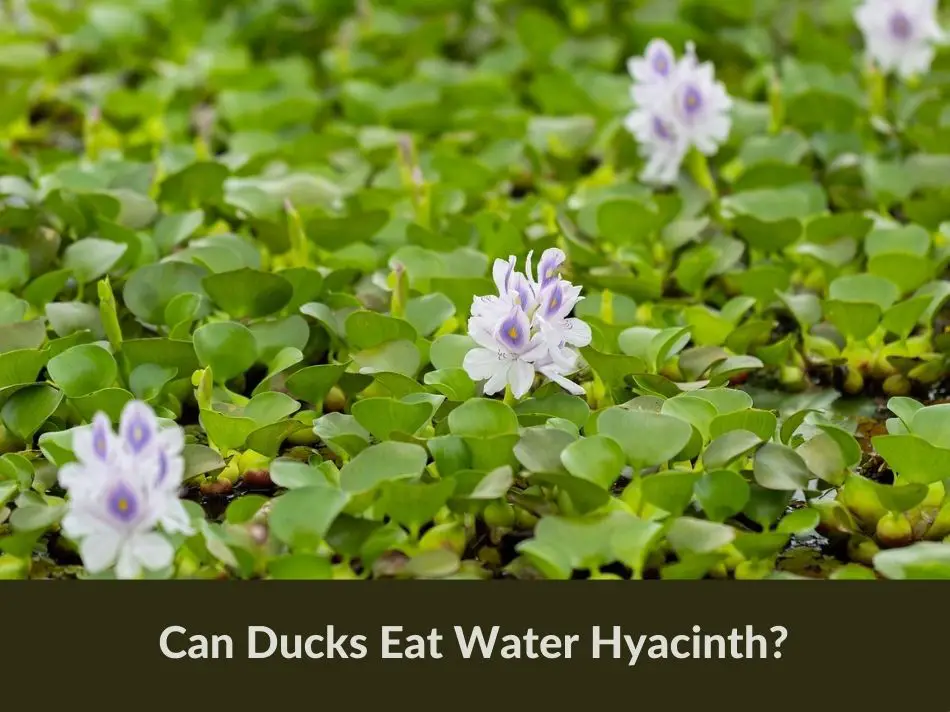Ducks are omnivores, meaning their diet includes both plant and animal matter. In the wild, they feast on a diverse buffet: aquatic plants, seeds, small fish, insects, and crustaceans form the core of their diet. But, can ducks eat water hyacinth?
Yes, ducks can nibble on water hyacinth. They often consume the leaves and flowers which are soft and easily digestible. This plant can provide them with additional nutrients and variety in their diet.
In this concise exploration, readers will gain insight into the dietary habits of ducks, specifically addressing the question of whether ducks can safely consume water hyacinth.
How Often Can I Feed My Ducks Water Hyacinth?
Even though water hyacinth is non-toxic and ducks can eat it, moderation is key. Feeding ducks water hyacinth should be done sparingly, as part of a diverse and balanced diet. Caretakers might consider offering water hyacinth as a treat rather than a staple.
For instance, introducing water hyacinth to a duck’s diet once a week could provide a good balance. It’s crucial to observe the ducks for any adverse reactions after eating the plant, as individual sensitivities may vary.
Can Ducklings Eat Water Hyacinth?
When it comes to ducklings, their diet should be even more carefully monitored due to their developing digestive systems. While adult ducks can process a variety of foods, ducklings have more specific needs.
Ducklings can theoretically eat water hyacinth, but it should be introduced slowly and in tiny amounts once they have already been established on a starter feed.
Caretakers should prioritize high-protein and nutrient-rich foods for ducklings to support their rapid growth and development before considering water hyacinth as a dietary addition.
Are Water Hyacinths Healthy For Ducks?
Protein Content:
The protein in water hyacinth is a notable benefit for ducks. It supports body tissue repair, growth of new feathers, and is crucial during molting and for the development of ducklings. The protein in the leaves and flowers of the water hyacinth can be a beneficial supplement to the ducks’ regular diet, contributing positively to their overall health.
Fiber Content:
Water hyacinth is a good source of fiber, which is essential for the digestive health of ducks. It ensures the smooth movement of food through the digestive tract and can help with nutrient absorption by regulating the digestive process. The fibrous material of the plant is particularly good for the gizzard, helping it to function properly by grinding the food down.
Vitamin A:
Although not a primary source of vitamin A, water hyacinth can contribute to the intake of this vital nutrient. Ducks require vitamin A for several body functions, including vision, immune response, and skin health. Adding water hyacinth to a duck’s diet can help them maintain adequate vitamin A levels, complementing other dietary sources.
Vitamin C:
Ducks can produce vitamin C naturally, but the additional amount from water hyacinth can offer extra support for their immune system. It may be especially beneficial during stressful times, promoting overall health and aiding in recovery from diseases or injuries.
Calcium:
The calcium found in water hyacinth contributes to the nutritional needs of ducks. It is critical for bone development and maintenance, and for female ducks, it aids in producing strong eggshells. While ducks require a controlled intake of calcium, water hyacinth can be a helpful supplement in their diet.
Hydration:
The high water content in water hyacinth provides an additional hydration source for ducks. This is particularly valuable in hot climates or seasons, supporting the ducks’ need for regular water intake. While it doesn’t replace their need for drinking water, it can be a beneficial moisture source.
Toxin Considerations:
Caretakers must be cautious about where the water hyacinth is sourced. The plant’s tendency to absorb toxins from its growing environment means it could potentially introduce harmful substances into a duck’s diet. Ensuring the water hyacinth is free from contaminants is crucial before it’s given to ducks.
Each of these nutritional aspects underscores the potential benefits and considerations of including water hyacinth in the diet of ducks. It should be offered as a supplement to a balanced diet, ensuring the ducks receive all the nutrients they need for a healthy life.
More Flowers Ducks Can Eat
In addition to their regular diet, ducks can safely consume a variety of flowers, which can provide them with additional nutrients and variety. Many garden flowers are not only non-toxic but can be quite nutritious for ducks.
Here are five more flowers that are safe for ducks to eat:
- Lilacs – These fragrant blooms can add a bit of variety to a duck’s diet.
- Petunias – Bright and colorful, petunias are a safe choice for ducks to nibble on.
- Alfalfa – This plant is not only a flower but is also rich in protein and minerals.
- Marigolds – Known for their vibrant color, marigolds are a nutritious option for ducks.
- Clover – Easy to find and full of nutrients, clover is a favorite among many ducks.
These flowers can add enrichment to a duck’s diet and provide them with a diverse array of nutrients. Always introduce new foods to ducks gradually and in small quantities to monitor their reactions.
Make sure to check out our full list of flowers and plants that ducks can eat.
Conclusion
To summarize, water hyacinth can be a natural snack for ducks, but should not be the primary component of their diet. Caretakers and park visitors should prioritize a nutritionally balanced diet for ducks and introduce any new foods, including water hyacinth, slowly and in moderation.
It’s always best to consult with a veterinarian or a duck nutrition specialist if there are any doubts about the best diet for these birds.
Disclaimer: The information in this article is for informational purposes only. I'm not an expert or a veterinarian.


